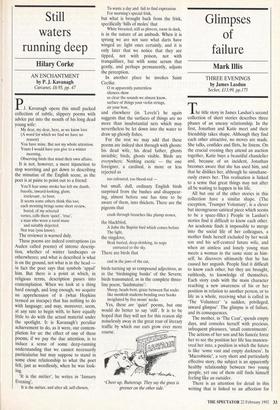Still waters running deep
Hilary Corke
AN ENCHANTMENT by P. J. Kavanagh Carcanet, f6.95, pp. 47 PJ. Kavanagh opens this small packed collection of subtle, slippery poems with advice put into the mouth of his long dead young wife: My dear, my dear, here, as we know love (A word for which we find we have no reason)
You have mine. But not my whole attention.
Yours I would have you give to a winter morning, Observing birds that mind their own affairs. It is not, however, a mere injunction to
stop worriting and get down to describing the minutiae of the English scene, as the
poet is at pains to point out to a friend: You'll fear some stroke has left me dumb, bucolic, inward-looking, glum;
irrelevant , to boot.
It seems some others think this too; each morning brings some short review, bored, of my selected verses, calls them 'quiet', 'true', a man who woos a rural muse and suitably dejected.
Not true (you know).
The reviewer is warned duly.
These poems are indeed contraptions (as Auden called poems) of intense descrip- tion, whether of winter landscapes or otherwheres; and what is described is what is on the ground, not what is in the head in fact the poet says that symbols 'appal' him. But there is a point at which, in religious terms, description passes into contemplation. When we look at a thing hard enough, and long enough, we acquire an apprehension of it (what Hopkins termed an inscape) that has nothing to do with language; and may, moreover, seem, at any rate to begin with, to have equally little to do with the actual material under the spotlight. It is Kavanagh's peculiar achievement to do, as it were, our contem- plation for us: the effect of one of these poems, if we pay the due attention, is to induce a sense of some deep-running understanding that we cannot necessarily particularise but may suppose to stand in some close relationship to what the poet felt, just as wordlessly, when he was look- ing.
`It is the métier', he writes in `January Evening',
It is the métier, and after all, self-chosen, To waste a day and fail to find expression For morning's special frisk,
but what is brought back from the frisk, specifically 'hills of moles' that
White breasted, still as plovers, roost in dark,
is in the nature of an ambush. When it is sprung we are not sure what darts have winged us: light ones certainly, and it is only later that we notice that they are tipped, not with poison, not with tranquilliser, but with some serum that gently, and perhaps permanently, adjusts the perception.
In another place he invokes Saint Cecilia:
0 in apparently patternless
silences show us clear the sounds we almost know, surface of things your violin strings, air your bow,
and elsewhere (in 'Levels') he again suggests that the surfaces of things are no more than insubstantial nets which may nevertheless be let down into the water to draw up ghostly fishes.
For the rest we may add that these poems are indeed shot through with ghosts: his dead wife, his dead father, ghosts invisible; birds, ghosts visible. Birds are everywhere. Nothing exotic — the one foreigner, a cardinal, is more or less rejected as
too coloured, too blood-red -
but small, dull, ordinary English birds surprised from the bushes and disappear- ing, almost before one has time to be aware of them, into thickets. There are the pigeons that
crash through branches like plump stones,
the blackbird,
A John the Baptist bird which comes before The light,
the ringdove,
Beak buried, deep-drinking, its nape entrusted to the sky.
There are birds that
end in the jaws of the cat,
birds turning up as compound adjectives, as in the 'birdsinging banks' of the Severn; birds transmuted, as in the complete three- line poem, `Inishmaine':
Sheep, heads bent, graze between flat rocks like monkish students bending over books invigilated by five swans' necks.
Yes, these are 'quiet' poems, but one would do better to say 'still'. It is to be hoped that they will not for this reason slip noiselessly away in the great roarrof literary traffic by which our ears grow ever more coarse.
'Cheer up, Buttercup. They say the grass is greener on the other side.'


















































 Previous page
Previous page